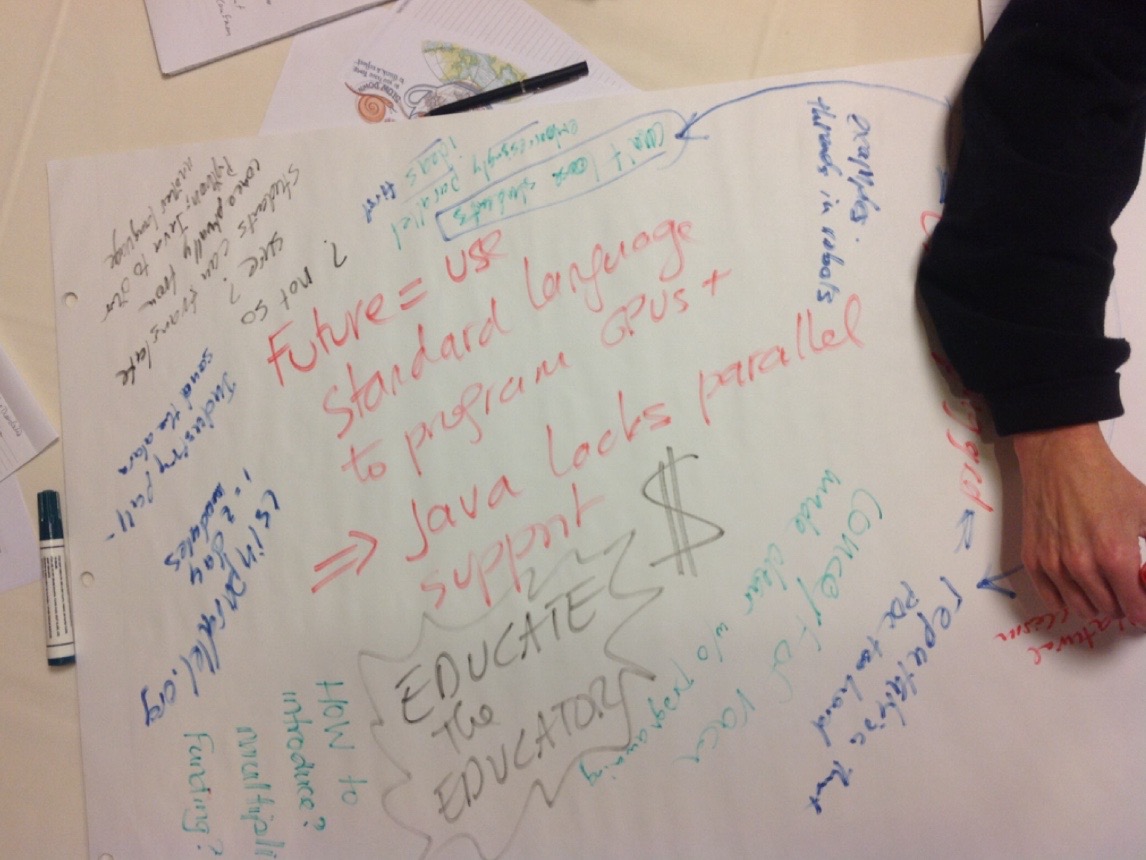Difference between revisions of "NSF Workshop 08/17/2015"
(→NSF Workshop on Parallel & Dist. Computing EducationWashington, D.C., Aug. 18-19, 2015) |
(→NSF Workshop on Parallel & Dist. Computing EducationWashington, D.C., Aug. 18-19, 2015) |
||
| Line 14: | Line 14: | ||
The workshop was conducted over one and a half days, in the form of [http://www.theworldcafe.com/key-concepts-resources/world-cafe-method World Café meetings]. This was my first experience with this type of meeting, and I really enjoyed it for it allowed everybody to meet most of the people in the group in the first half day, and made for very informative and friendly gatherings. This is something that could be useful in a classroom environment. The caveat is that very precise questions should be given to the group, so that each table stays on track with the discussion, otherwise moving from one table to the next could result in switching from one discussion theme to a totally different one. | The workshop was conducted over one and a half days, in the form of [http://www.theworldcafe.com/key-concepts-resources/world-cafe-method World Café meetings]. This was my first experience with this type of meeting, and I really enjoyed it for it allowed everybody to meet most of the people in the group in the first half day, and made for very informative and friendly gatherings. This is something that could be useful in a classroom environment. The caveat is that very precise questions should be given to the group, so that each table stays on track with the discussion, otherwise moving from one table to the next could result in switching from one discussion theme to a totally different one. | ||
<br /> | <br /> | ||
| + | <onlysmith> | ||
<center>[[Image:NSFWorkshop081615.jpg|400px]]</center> | <center>[[Image:NSFWorkshop081615.jpg|400px]]</center> | ||
| + | </onlysmith> | ||
<br /> | <br /> | ||
---- | ---- | ||
Latest revision as of 14:54, 21 August 2015
--D. Thiebaut (talk) 14:47, 21 August 2015 (EDT)
NSF Workshop on Parallel & Dist. Computing EducationWashington, D.C., Aug. 18-19, 2015
I attended the invitation-only NSF Workshop on Broadening Parallel and Distributed Computing Undergraduate Education, organized by Comp. Sci. Prof. Chip Weems, of Umass, in Washington, D.C. The workshop was organized by the Center for
Parallel and Distributed Computing Curriculum Development and Educational Resources (CDER).
The workshop was conducted over one and a half days, in the form of World Café meetings. This was my first experience with this type of meeting, and I really enjoyed it for it allowed everybody to meet most of the people in the group in the first half day, and made for very informative and friendly gatherings. This is something that could be useful in a classroom environment. The caveat is that very precise questions should be given to the group, so that each table stays on track with the discussion, otherwise moving from one table to the next could result in switching from one discussion theme to a totally different one.
The official description of the meeting is reported below:
- Over the last five years the CDER Center has designed a curriculum guideline for undergraduate level instruction in parallel and distributed computing (PDC) that influenced and is referenced by the ACM 2013 Computer Science Curriculum. The effort focused on introducing PDC concepts in the first two years of the curriculum, so that students could start learning early to incorporate PDC into their problem solving approaches. It was followed up with a series of workshops, and small grants to early adopters of the curriculum. Although successful in many regards, there remains much to be done to help the discipline shift to embracing PDC education more broadly.
- This workshop is intended to bring together a diverse group of stakeholders with interests in PDC education to facilitate discussion, networking, and to gather input for future efforts. The conversations will be guided by three questions:
- Question 1: What more can be done to broaden participation in the implementation of parallel and distributed computing topics in the first two years of undergraduate computer science and engineering programs?
- Question 2: Assuming broad implementation of PDC topics in the first two years of undergraduate education, what opportunities does that preparation open for deeper coverage in upper level undergraduate and graduate courses?
- Question 3: Given the current PDC curriculum guidelines and the discussions from the previous day, how should the guideline be updated?
- Organizers:, Charles Weems, U. of Massachusetts, Amherst, Alan Sussman, U. of Maryland, College Park, Arnold Rosenberg, Northeastern U., Anshul Gupta, IBM, Sushil Prasad, NSF, Almadena Chtchelkanova, NSF, Amy Apon, NSF, Mimi McClure, NSF.
- Keynote Speaker: Randy Bryant, White House Office of Science and Technology Policy.
- Participants: Anyndia Banerjee, NSF, Randy Bryant, White House Office of Science and Technology Policy, Barbara Chapman, U. of Houston, Debzani Deb, Winston-Salem State U., Akshaye Dhawan, Ursinus College, John Dougherty, Haverford College, Trilce Estrada, U. of New Mexico, Diana Franklin, U.C. Santa Barbara, Eric Freudenthal, U. of Texas, El Paso, Ajay Gupta, Western Michigan U., Karen Karavanic, Portland State U., George Karypis, U. of Minnesota, Dan Katz, NSF, Andrew Lumsdaine, Indiana U., Brandeis Marshall, Spelman College, Duane Merrill, NVIDIA, Edusmildo Orozco Salcedo, U. of Puerto Rico, Cynthia Phillips, Sandia National Laboratory, Erik Saule, U. of North Carolina, Charlotte, Chi Shen, Kentucky State U., Libby Shoop, Macalaster College, Michelle Strout, Colorado State U., Violet Syrotiuk, Arizona State U., Michela Taufer, U. of Delaware, Dominique Thiebaut, Smith College, R. Vaidyanathan, Louisiana State U., Susan Wang, Mills College, Michael Wrinn, Intel.
